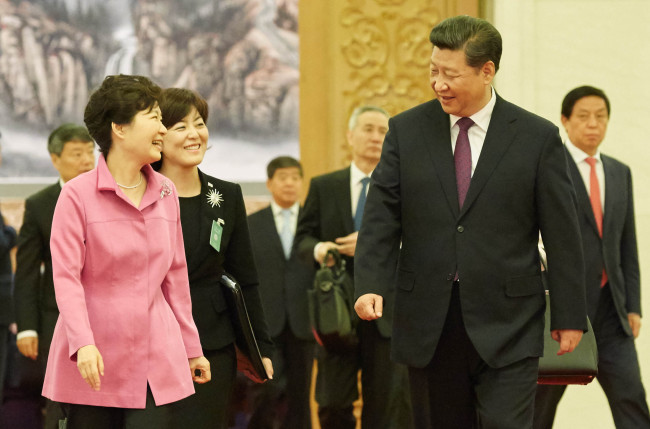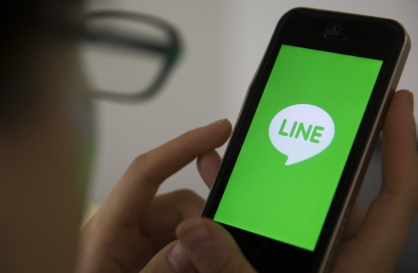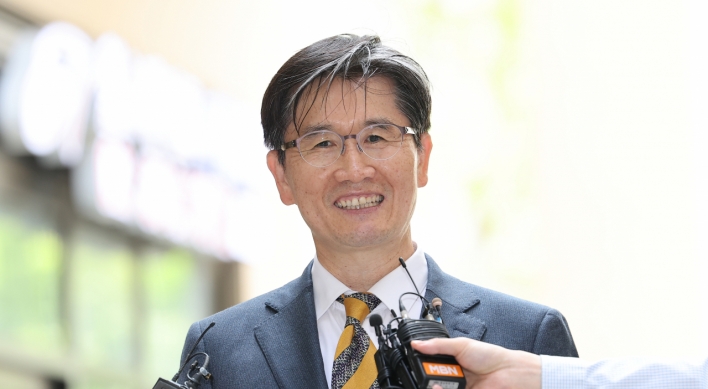Park, Xi voice against provocations
Leaders agree to hold trilateral summit with Japan in late autumn
By Korea HeraldPublished : Sept. 2, 2015 - 18:49
Leaders of South Korea and China on Wednesday took a joint step to press North Korea, stressing that they are opposed to any action that causes tension on the Korean Peninsula, in a landmark summit that highlighted the “best ever” strategic cooperative partnership of the two countries.
Presidents Park Geun-hye and Xi Jinping urged resumption of a long-stalled six-way talks to curb North Korea’s nuclear ambition as soon as possible, and agreed to hold a trilateral meeting with Japan “at a convenient time” in late October or early November.
Presidents Park Geun-hye and Xi Jinping urged resumption of a long-stalled six-way talks to curb North Korea’s nuclear ambition as soon as possible, and agreed to hold a trilateral meeting with Japan “at a convenient time” in late October or early November.

The leaders also expressed hopes to accelerate a trust-building process in the region based on the agreements reached at the breakthrough inter-Korean talks last month. They also agreed to seek ways to promote Park’s “Eurasia Initiative” aimed at linking a railway between the Koreas and Europe.
At the summit in Beijing, Park stressed the importance of China’s role in defusing military tension between the two Koreas and urged her Chinese counterpart to further bolster bilateral ties to secure regional stability amid North Korea’s evolving nuclear threat.
“I’d like to express my gratitude to China for playing a constructive role in defusing (military) tensions on the Korean Peninsula by closely communicating with each other,” said Park at the summit held right after her arrival at the Chinese capital.
Touching on North Korea’s mine attack in the demilitarized zone last month, Park said the incident was a reminder of a highly volatile security of the Korean Peninsula and of a pressing need to bring peace in the region.
“I believe that the incident reflected the importance of the strategic cooperation between South Korea and China and the unification of the two Koreas in securing regional peace.”
Xi also thanked Park saying that their cooperation had brought the bilateral partnership to the highest level of friendship.
“Today, the amicable relationship between South Korea and China has developed to the highest level through the cooperation between President Park and I,” said Xi.
“Currently, the two countries maintain a partnership in various fields including politics, economy and trade, while civil exchanges are also thriving,” he said adding that the two should join hands for peace beyond the region.
Inter-Korean tension is fading after breakthrough talks between two Koreas last week. It was the first time that the South Korean leader had mentioned China’s role in reaching an agreement with Pyongyang, Beijing’s traditional ally.
China is believed to have exerted considerable influence on North Korea, which has long been dependent on Chinese diplomatic support and economic aid. Cheong Wa Dae did not elaborate on how China helped ease the tensions sparked by North Korea’s land mine attack.
North Korea expressed regret over the mine blast in DMZ and vowed to promote inter-Korean exchanges both at the civil and public level, including reunion events for separated families.
Park left for China on early Wednesday morning for a three-day trip intended to attend events to mark the end of World War II.
The summit was held a day before events that were viewed as a forum for South Korea to cement its increasingly amicable ties with China on both economic and security terms and secure a delicate balance amid the intensifying rivalry between Beijing and Washington. It was Park’s sixth summit with Xi after she entered office in early 2013.
On Thursday, China celebrates what it calls the “Victory of the Chinese People’s Resistance Against Japanese Aggression and World Anti-Fascist War,” seen as Beijing’s attempt to highlight Japan’s surrender in the war and to push for a much bolder nationalist agenda amid growing fear over economic slowdown.
Park will be in the stands at Tiananmen Square, along with other high-profile leaders including Russian President Vladmir Putin and U.N. Secretary-General Ban Ki-moon. Park’s attendance at the military parade was seen as lending international credibility to an event shunned by the leaders of Western democracies such as the United States, Britain, France and Australia over concerns that the event could stoke Beijing’s rivalry with Japan.
After the meeting with Xi, Park was invited to a special luncheon, which South Korean officials said was a rare event that demonstrated China’s special hospitality toward Park.
She also held separate talks with Chinese Prime Minister Li Keqiang. The two sides agreed to work closely to highlight the need for parliamentary approval for the Korea-China free trade agreement within this year.
To strengthen business ties with China, a large group of business representatives accompanied Park on her trip. China is South Korea’s largest trade partner. Trade volume between South Korea and China stood at $228.9 billion in 2013.
Before returning home, Park plans to attend a reopening of the headquarters of the Korean Provisional Government that and a business forum in Shanghai. She returns on Friday.
By Cho Chung-un (christory@heraldcorp.com)
-
Articles by Korea Herald










![[Weekender] How DDP emerged as an icon of Seoul](http://res.heraldm.com/phpwas/restmb_idxmake.php?idx=644&simg=/content/image/2024/04/25/20240425050915_0.jpg&u=)

![[Today’s K-pop] NewJeans' single teasers release amid intrigue](http://res.heraldm.com/phpwas/restmb_idxmake.php?idx=644&simg=/content/image/2024/04/26/20240426050575_0.jpg&u=)






![[Herald Interview] Mistakes turn into blessings in street performance, director says](http://res.heraldm.com/phpwas/restmb_idxmake.php?idx=652&simg=/content/image/2024/04/28/20240428050150_0.jpg&u=)
